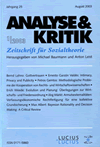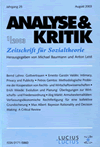Suchergebnisse
"Hans Bernhard Schmid"
Titel: The Idiocy of Strategic Reasoning. Towards an Account of Consensual Action
Autor: Hans Bernhard Schmid
Seite: 35-56
Abstract: Practical reasoning is an agent's capacity to determine her course of behavior on the base of some evaluation of available alternatives. Reasoning is instrumental insofar as an agent decides over available alternatives by aiming to choose the best means to realize her own goals. Reasoning is strategic if the agent assumes that what the best means to realize her own goals is depends on what other agents will do. Strategic reasoning still plays a central role in influential accounts of social action. This paper first argues for the view that purely strategic reasoners are unable to achieve even the most basic and unproblematic forms of mutually beneficent coordination, and then gathers some elements of a richer account of relevant forms of practical reasoning.
Titel: Comment on Hans Bernhard Schmid: Coordination, Cooperation and the Origin of Normative Expectations
Autor: Fabian Schuppert
Seite: 57-64
Abstract: This comment suggests that coordination and cooperation are very different things, as the former simply is a device for problem-solving, while the latter relies on the existence of some shared intentionality. Similarly there exist different origins for the normative expectations an agent might form. Hence the comment argues that Schmid's taxonomy of action types, though helpful, needs to be extended and revised.
Titel: 'Nostrism': Social Identities in Experimental Games
Autor: Hans Bernhard Schmid
Seite: 172-187
Abstract: In this paper it is argued that a) altruism is an inadequate label for human cooperative behavior, and b) an adequate account of cooperation has to depart from the standard economic model of human behavior by taking note of the agents' capacity to see themselves and act as team-members. Contrary to what Fehr et al. seem to think, the main problem of the conceptual limitations of the standard model is not so much the assumption of sel shness but rather the atomistic conception of the individual. A much-neglected question of the theory of cooperation is how the agent's social identity is determined, i.e. how individuals come to think of themselves and act as members of a group. Considering as an example one of Fehr et al.'s third party punishment experiments, I shall argue that the agents' identities (and thus the result of the experiment) are strongly in uenced by the way the experiment is presented to the participants, especially by the collectivity-related vocabulary used in the instructions.

Work and Cooperation
2011 (33) Heft 1
Editorial
Both in social theories with the aim of looking into the creative core of society as well as in everyday politics, two intuitions often supplement each other. The first intuition, empirico-analytical, views common organization of work and production as being the very aim of society, and other parts of society being explicable from this. A second intuition, ethical or moral, holds the sphere of work to be the central site for diagnoses of a society's inherent justice. Both intuitions not only con...

Ernst Fehr on Human Altruism. An Interdisciplinary Debate
2005 (27) Heft 1
Editorial
In the foregoing decade, two related developments in the behavioural sciences have drawn the attention of social scientists, particularly economists. The first is the use of laboratory experiments in the investigation of human behaviour. Although the use of such experiments has a longer history, only in the last decade has ’experimental economics’ become a sub-discipline of economics with which economists of just about all colours are familiar; indeed, experimental results regularly feed int...